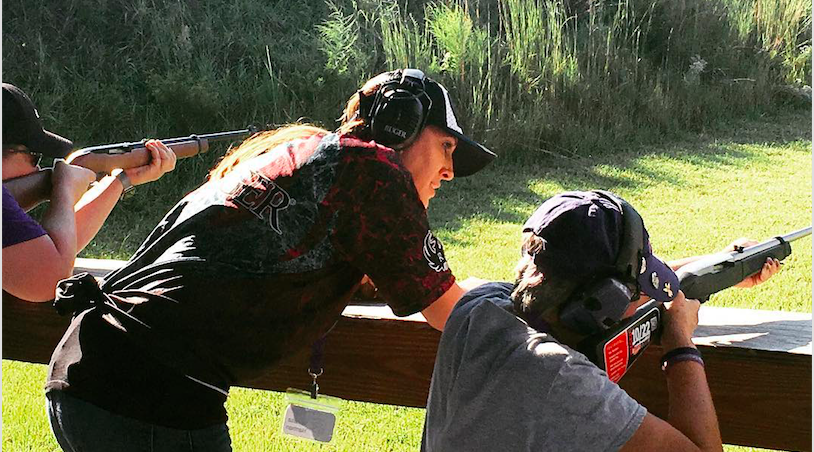Sturm Ruger will track and report on gun violence involving the company’s products, after shareholders backed a proposal that the company’s board had recommended not adopting.
The resolution was put forward at the company’s annual meeting, held Wednesday, by a small coalition of investors who began buying gun stocks two years ago so that they could pressure executives for change. Their efforts received little attention before a February shooting left 17 people dead at a Parkland, FL high school.
By February 2019, Sturm Ruger must produce an assessment on how the company tracks violence associated with the company’s firearms, what kind of research the company is conducting related to so-called smart gun technology and the company’s assessment of the risks that gun-related crimes pose to the company’s reputation and finances.
The proposal was submitted in January by 11 members of the Interfaith Center on Corporate Responsibility, a shareholder advocacy organization that included health care networks and several groups of Roman Catholic nuns. The company said in a public filing that “the intentional criminal misuse of firearms is beyond our control.”
In March, Ruger indicated the company did not support the proposal, pointing to existing safety policies. The company stated that any violent or criminal use of the company’s guns was a matter for law enforcement.
At the company’s annual meeting on Wednesday Ruger’s CEO, Christopher Killoy, said that the company will comply and prepare the report. But he played down the impact of any report.
“That proposal has received a lot of media attention and I’m confident that its passage will as well, but I want to be really clear about what this proposal represents and what it does not,” said Killoy at the meeting. “The proposal requires Ruger to prepare a report; that’s it, a report. The shareholders have spoken and we will follow through on our obligation to prepare that report in due course. What the proposal does not and cannot do is to force us to change our business, which is lawful and constitutionally protected. What it does not do and cannot do is force us to adopt misguided principles created by groups, who do not own guns, know nothing about our business and frankly would rather see us out of business. The proposal also cannot change what Ruger is about and what we stand for.”
A similar resolution was filed with American Outdoor Brands, the parent company of Smith & Wesson, and shareholders are expected to consider it in September.
The nuns had on their side the two most important shareholder advisory firms in the country: Institutional Shareholder Services (ISS) and Glass Lewis. The companies assess corporate governance and long-term risk and advise investors in publicly traded companies on how to vote on proposals at shareholder meetings. In separate memos, both ISS and Glass Lewis endorsed the motion submitted by the nuns. Both advisory companies pointed to the recent bankruptcy proceedings of Remington as a cautionary example.
ISS saw the proposal as “concrete evidence that the board is properly assessing risks to the company’s long-term viability.”
The shareholder vote was the first major test this year for faith-based shareholder groups, which have been urging the nation’s gun industry to act after recent extreme examples of gun violence.
Overall, gun control activism has been on the rise since a mass shooting in Parkland.
Vista Outdoor said last week that the company was exploring the sale of the company’s firearms gun brands. Dick’s Sporting Goods announced earlier this year that the company would to stop selling “assault-style” guns. Walmart, L.L. Bean and Kroger, which sells guns through the company’s Fred Meyer stores, all raised their minimum gun buying age to 21. Walmart stopped selling military-style semiautomatic rifles in 2015.
BlackRock, the largest shareholder in Ruger and American Outdoor Brands and the second-largest shareholder in Vista, said last month that the company is launching gun-free funds for retirement plans.
The shareholder vote came as Ruger posted another quarter of declining earnings and sales, although Killoy noted that the trend had improved since the fourth quarter. Results have been challenged since the surprise election of Donald Trump reduced concerns that stricter gun-ownership policies would arrive.
In the quarter ended March 31, net income declined 35.8 percent to $14.3 million, or 81 cents a share, just ahead of Wall Street’s consensus estimate of 80 cents. Sales fell 21.6 percent to $131.2 million, ahead of Wall Street’s average target by $3.7 million.
Among the highlights in the quarter:
- The decrease in earnings was attributed to “the sales decline and the unfavorable de-leveraging of fixed manufacturing costs due to the decline in production volumes.”
- A change in accounting method tied to the timing of revenue recognition related to certain sales promotion activities involving the shipment of no-charge firearms reduced company sales by $2.4 million in the quarter, gross margin by approximately 3 percent and EPS by approximately 4 cents.
- Sales of new products, including the Pistol Caliber Carbine, the Mark IV pistol, the LCP II pistol, the EC9s pistol, the Security-9 pistol and the Precision Rimfire Rifle, represented $37.2 million or 29 percent of firearm sales in the first quarter. New products represent items launched in the past two years.
- The estimated unit sell-through of the company’s products from the independent distributors to retailers decreased 5 percent in the quarter. For the same periods, the National Instant Criminal Background Check System background checks (as adjusted by the NSSF) increased 1 percent. The decrease in estimated sell-through was attributed to decreased overall consumer demand in the early stages of the first quarter of 2018, partially offset by increased demand in the latter part of the quarter.
- Favorable distributor sell-through trends in the latter half of the quarter resulted in significant reductions of inventories at the company and at the independent distributors. During the quarter, the company’s finished goods inventory decreased 51,900 units and distributor inventories of the company’s products decreased by 69,000 units.
“In Q1 of 2018, things started to turn around,” said Killoy at the shareholder meeting. He noted that while sales and profits decreased year-over-year, sales increased 11 percent and EPS climbed 37 percent versus the fourth quarter. Cash generated from the operations the quarter also reached $45 million.
Killoy also reminded shareholders that Ruger is one of the few firearms manufacturers that only sells through distributors, underscoring the importance to the company of working down distributor inventory levels over the last year.
“Distributor inventory is also down significantly,” said Killoy. Distributor inventory peaked in Q217 and has moved down steadily over the three quarters 252,000 at the end of Q1.
He said it’s reasonable that distributors should be able to turn inventory as a target rate, six to eight times, and currently turn is just below six times and a sign of healthier rate, Killoy showed shareholders on a slide.
“That’s not a perfect science,” said Killoy. “Things go up. Things go down, but we’re very pleased with how we ended Q1 from both inventory in the channel at the wholesale level, anecdotally what we hear at the retail level and then certainly at Ruger down to 51,000 units.”
Regarding the company’s balance sheet, Killoy noted that the company has a current cash balance of about $120 million, accounts receivable are current at 97 percent and no debt. He added, “That’s the other thing that separates us from a lot of our fellow companies in the news, the strength of our balance sheet as well as the strength of the overall health of the company.”
Competitor Remington Outdoors filed for bankruptcy protection earlier this year.
Most of the questions in the Q&A session dealt with the firearms safety proposal.
Colleen Scanlon, SVP and chief advocacy officer of Catholic Health Initiatives who has been credited with driving the proposal, asked Killoy what steps Ruger was taking to come out with safer guns and gun products and steps to mitigate the company’s risk to gun violence. She said, “While gun violence is an issue of concern to everyone, the responsibility to market safe guns sold to the public appropriately lies with gun manufacturers and distributors.”
She also noted that while some retailers are taking steps to remove assault-style weapons and many banks, credit card companies, institutional investors and large asset managers are re-accessing their relationships with the firearms industry, “we have seen no evidence of our company’s efforts to change its practices and policies.”
She added, “The American public will continue to seek solutions to random senseless gun violence from all stakeholders. They will return to gun manufacturers and expect an honest accounting of the efforts they have made to avoid these tragic events. We want to see Sturm, Ruger presenting solutions and we look forward to working with you to pursue any and all efforts to advance gun safety. If new product development, as you said Mr. Killoy, is the lifeblood of Sturm Ruger, safer guns need to be on that development agenda.”
Killoy responded that Ruger has a long commitment to gun safety, becoming the first firearms company to invent a transfer bar safety to prevent accidental discharge in Colt-style, single-action revolvers. Locks have been shipped with every firearm for the last 30 years as a voluntary measure to ensure the safe storage of Ruger’s firearms.
“I can assure you that at every stage of a new product development, we’re constantly looking at things like the product’s ability to handle a drop test, product’s ability to incorporate a manual safety that works reliably when it should and when it shouldn’t,” said Killoy. “And in fact, we’ve actually had recalls over the years; when we had a problem with that, we discovered there might be something that just wasn’t as good as it should be. And we recall those products as necessary. So we do take that very seriously.”
Asked about the company’s unwillingness to meet with shareholder to address solutions to gun violence, Killoy said the company doesn’t meet with individual shareholders in general. He also noted that the company doesn’t meet with the largest institutional shareholders, like BlackRock or Vanguard, because it may be a violation of disclosure obligations under SEC Regulation FD.
“Regardless,” Killoy added, “I don’t think those people, or even shareholders who advance what I would consider to be activist or well-intentioned proposals have our company’s best interest at heart. Our company’s best interest is served by meeting the needs of our customers at the wholesale, retailer and consumer level and those customers and we do share a responsibility to our shareholders to ensure a fair return on their investment in the company and we don’t see that people who ask us to stop manufacturing firearms that are perfectly legal and sold throughout the country is in the best interest of our shareholders.”
















